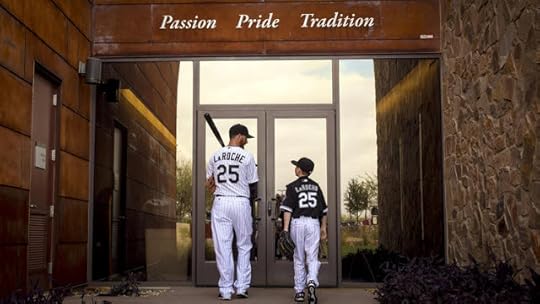#FamilyFirst? Adam LaRoche's First World Dilemma
 Photo Credit: Brian Cassella #FamilyFirst? Adam LaRoche's First World Dilemma by Mark Anthony Neal | @NewBlackMan | NewBlackMan (in Exile)
Photo Credit: Brian Cassella #FamilyFirst? Adam LaRoche's First World Dilemma by Mark Anthony Neal | @NewBlackMan | NewBlackMan (in Exile)When 12-year Major League Baseball veteran Adam LaRoche announced his retirement, citing the desire of his employers--The Chicago White Sox--to limit the time his 14-year-old son spent in the clubhouse, I, too, felt a tugging at the heartstrings. But before we coronate LaRoche as the new icon of a so-called #FamilyFirst movement, let’s be clear that his “sacrifice” is borne of a level of privilege and wealth that most Americans simply do not have access to.
As a parent who prides himself on being both accessible to my daughters and engaged in all facets of their lives, it is always great to hear of parents, particularly fathers, who try to design their professional lives in a manner to maximize time with their children. Indeed there’s been a long tradition in Major League Baseball of the sons of players serving as bat boys. Hall of Famer and “Iron Man” Cal Ripken, Jr. served as bat boy when his father was a coach for the Baltimore Orioles in the 1970s, though Darren Baker, son of Washington Nationals’ manager Dusty Baker, might be the the most famous. Baker’s presence as a bat boy at age 3 in 2002 raised eyebrows when he avoided being run over at home plate during the 2002 World Series.
The LaRoche story has generated traction, in part, because of reports that he will be forgoing the final year of a two-year contract he signed last year, that would pay him $13 Million in base salary in 2016. However laudable LaRoche’s decision, the fact of the matter is that after a relatively long professional career, he likely had the financial stability to walk away from $13.
Most Americans lack such financial stability, let alone the ability to give up gainful employment.
The case of single mothers, particularly Black and Latina mothers, is instructive. Not only is staying at home to be with their young children not an option, such women are actively demeaned by the State and pundits when they choose to do so with the assistance of the State. Alternatively when single mothers choose to work--often earning depressed wages--they are often forced to bring young children to work with them because of the exorbitant cost of child care. Ironically when many of these mothers are unable to physically provide the level of care and attentiveness to their children--that those with privilege and money take for granted--they are castigated as being “bad” mothers.
LaRoche’s story might also resonate differently for some African-Americans, who remember when Black children had no choice but to work alongside their parents in the Jim Crow South, because they were valued by planters and landowners for their labor; their childhood denied.
Indeed there was a certain level of resistance conveyed within Jim Crow for those Black men, who had the financial stability to allow their children and wives to leave the field. Such men and women were rarely thought of as heroes, but rather as targets of White vigilantes who saw such Black families as threats to a racist social order.
Again, I am happy for the LaRoche family, but let’s not over celebrate a decision that is the byproduct of wealth and privilege, in a society where so many others can’t afford to put #FamilyFirst.
***
Mark Anthony Neal is Professor of African + African American Studies and Professor of English as Duke University. Neal is the host of the video podcast Left of Black. Follow him on Twitter at @NewBlackMan.
Published on March 17, 2016 12:16
No comments have been added yet.
Mark Anthony Neal's Blog
- Mark Anthony Neal's profile
- 30 followers
Mark Anthony Neal isn't a Goodreads Author
(yet),
but they
do have a blog,
so here are some recent posts imported from
their feed.



